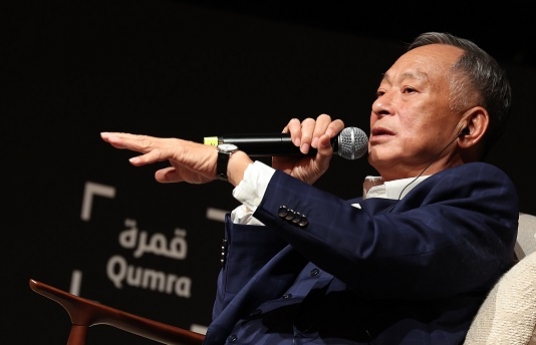Doha offers great opportunities for directors to broaden their horizons: Qumra Master Johnnie To
Apr 09, 2025

Doha, Qatar; April 9, 2025: Qumra Master Johnnie To, one of Hong Kong’s most influential and celebrated filmmakers, underlined the need for constant evolution and cross-border collaboration in filmmaking.
Addressing audiences at the last Masterclass at Qumra, the annual talent incubator event by Doha Film Institute, Johnnie To said: “I see great opportunities in Doha. I wouldn’t have come here for no good reason. Different eras offer different opportunities and if you do not change, if you stay the same, it will be difficult to see something new happen.”
Johnnie To, who is mentoring talents at Qumra, said he was impressed by a project by a Qatari director. It sets an example of how the history of movies will evolve, and how filmmakers [anywhere in the world] can evolve into world-class directors as long as there are opportunities to keep going.”
The Qumra Master also said filmmakers should not be worried about artificial intelligence. “Today there are many different channels to watch films. With the pace of technological advancement, different types of software will continue to evolve but the importance of content creators, even with AI, will not die. We will survive if young directors broaden their horizons, and look at Asia, look at the whole world, look at the Middle East, where people are doing outstanding work.”
To, whose career spans four decades and more than 50 films, underscored how his passion for film was his biggest asset in shaping a career in the industry. Although he had four career choices, including being a policeman, he started as a messenger boy at TVB—Hong Kong’s largest television station. “I was driven by passion. I was determined from the very beginning to become an assistant director in five years. I kept watching other people shoot movies. I really wanted to make movies.”
The director of internationally acclaimed films like Election, PTU and Life Without Principle said his interest in films was sparked when he began watching films at the age of eight. “My father worked in a warehouse near a cinema, where I was allowed backstage. From there, I would watch films from behind the screen, moving from one side to the other to watch it. But I found films to be amazing, almost miraculous.”
He said working with the masters of Hong Kong cinema in the 1970s and 80s had a tremendous influence on him. “I was lucky because at the time, people were very receptive to cinema, and directors had the freedom to find new genres and subject matter to satisfy audiences.”
After his initial films, he began producing and directing films under his production company, Milkyway Image, co-founded with Wai Ka-fai. “I had already shot several films that were box office successes. In 1995, I did not shoot at all and was thinking about what my future should be. With Milkyway, Wai Ka-fai and I had consensus on our company that every one of our productions must be original. To date, we remain on the same page.”
Describing himself as an intuitive improvisational director, Johnnie To said he does not work from completed scripts and often writes the script simultaneously while shooting. “I don’t know how to shoot a completed script. Trying to shoot a finished script feels like shooting a film that is already completed.”
The masterclass offered insight on his approach to complex action sequences. Explaining a seven-minute single-take sequence, he said: “We would rehearse with actors using long sticks pretending they were cameras. The real camera would come in on the third day, and actual shooting on the fourth. Every movement had to be perfect, with no room for even one actor to make a mistake.”
Johnnie To said he doesn’t’ share too much with his actors beforehand. That is why he also prefers to work regularly with certain cast members. “My habit is not to waste time explaining to the actor. I see them as my silent partners who understand my style. That is why I can only do my films in Hong Kong with a cast and crew who understand my style of filmmaking.”